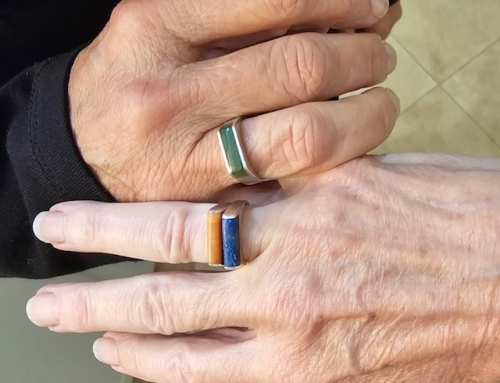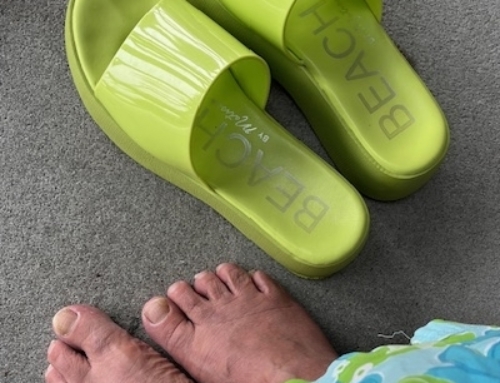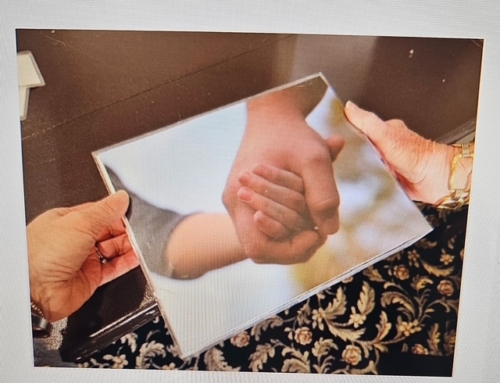
Good morning…
Still savoring this week’s post, To My Surprise, I thought to myself, “Within the first twenty-four hours of life, these baby cardinals felt their own hunger, found their own voice, asked for what they craved, and their red feathered father naturally nurtured their basic needs. If birds can do this, why is it so hard for us-humans?”
My question had me digging in our basement of old boxes for colorful strips of card stock – 1.5 inches by 11 inches – strips held together with one staple, holding wisdom I never want to forget. I received this multi-colored collection when I was studying for my masters degree in Human Development and Family Relations between 1985 to 1987 at the University of Connecticut. I have treasured this empowering pack ever since. In the thick of raising our four unique kids, after four years of infertility and four painful miscarriages, I referred regularly to these guidelines throughout my mothering adventure, and today I return to them with you, inspired by the baby cardinals and their attentive dad.
Strip one is red. From birth to six months, we develop the art of “Being.” Loving mentors mirror God’s voice:
“I’m glad you are alive.” “You belong here.” “What you need is important to me.” “I’m glad you are you.” “You can grow at your own pace.” “You can feel all your feelings.” “I love you and care for you willingly.”
Strip two is orange. From six to eighteen months, we develop the art of “Doing.” Joyful mentors mirror God’s voice:
“You can explore and experiment and I will support and protect you.” “You can use all of your senses when you explore.” “You can do things as many times as you need to.” “You can know what you know.” “You can be interested in everything.” “I like to watch you initiate and grow and learn.” “I love you when you are active and when you are quiet.”
Strip three is yellow. From eighteen months to three years, we develop the art of “Thinking.” Peaceful mentors mirror God’s voice:
“I’m glad you are starting to think for yourself.” “It’s OK for you to be angry and I won’t let you hurt yourself or others.” “You can say no and push and test limits as much as you need to.” “You can learn to think for yourself and I will think for myself.” “You can think and feel at the same time.” “You can know what you need and ask for help.” “You can become separate from me and I will continue to love you.”
Strip four is lime green. From three to six years, we develop the art of “Identity and Power.” Patient mentors mirror God’s voice:
“You can explore who you are and find out who other people are.” “You can be powerful and ask for help at the same time.” “You can try out different roles and ways of being powerful.” “You can find out the results of your behavior.” “All of your feelings are OK with me.” “You can learn what is pretend and what is real.” “I love who you are.”
Strip five is blue-grey. From ages six to twelve, we develop the art of “Structure.” Kind mentors mirror God’s voice:
“You can think before you say yes or no and learn from your mistakes.” “You can trust your intuition to help you decide what to do.” “You can find a way of doing things that works for you.” “You can learn the rules that help you live with others.” “You can learn when and how to disagree.” “You can think for yourself and get help instead of staying in distress.” “I love you even when we differ; I love growing with you.”
Strip six is teal blue. From ages thirteen to nineteen, we develop the art of “Identity, Sexuality, Separation.” Good mentors mirror God’s voice:
“You can know who you are and learn and practice skills for independence.” “You can learn the difference between sex and nurturing and be responsible for your needs and behaviors.” “You can develop your own interests, relationships and causes.” “You can learn to use old skills in new ways.” “You can grow in your maleness or femaleness and still be dependent at times.” “I look forward to knowing you as an adult.” “My love is always with you. I trust you to ask for my support.”
The final two strips are purple. As maturing adults, we develop the art of “Interdependence.” Gentle, faithful, self-controlled mentors mirror the voice of God:
“You can be creative, competent, productive and joyful.” “You can trust your inner wisdom.” “You can say your hellos and goodbyes to people, roles, dreams and decisions.” “You can finish each part of your journey and look forward to the next.” “Your love matures and expands.” “You are lovable at every age.” “Your needs are important.” “You can be uniquely yourself and honor the uniqueness in others.” “You can be independent and interdependent.” “Through the years you can expand your commitments to your own growth, to your family, your friends, your community and to all humankind.” “You can build and examine your commitments to your values and causes, your roles and your tasks.” “You can be responsible for your contributions to each of your commitments.”
I lean back, breathe slowly, and reflect for a while. I ponder the process of how we baby people, just like baby cardinals, know our deep hunger, develop our own unique voice, constructively ask for what we crave, and throughout our lives attentive mentors mirror for us the tone, the texture, and the tenderness of God’s voice of unconditional love.
Unfortunately, the natural process of healthy human development can be complicated by many unchosen factors. Abuse. Neglect. Poverty. Addictions. Violence. Divorce. Favoritism. Unemployment. Homelessness. The wrong crowd. Poor education. Racial injustice. Blended families. Psychological disorders. Privilege from birth. Excessive wealth. The family business. Manipulative power. “Be seen, not heard.” “Perform, perfect, please.” “Compare, compete, control, criticize, complain.” Regardless of skin color, zip code, or bank savings, hurting people inflict their own pain on vulnerable, less powerful people, like children.
The difference between God’s healthy ways and the world’s destructive ways are never more glaring than inside our families. This is how Galatians 5:19-23 (MSG) describes the difference.
It is obvious what kind of life develops out of trying to get your own way all the time: repetitive, loveless, cheap sex; a stinking accumulation of mental and emotional garbage; frenzied and joyless grabs for happiness; trinket gods; magic-show religion; paranoid loneliness; cutthroat competition; all-consuming-yet-never-satisfied wants; a brutal temper; an impotence to love or be loved; divided homes and divided lives; small-minded and lopsided pursuits; the vicious habit of depersonalizing everyone into a rival; uncontrolled and uncontrollable addictions; ugly parodies of community. I could go on.
This isn’t the first time I have warned you, you know. If you use your freedom this way, you will not inherit God’s kingdom.
But what happens when we live God’s way? He brings gifts into our lives, much the same way that fruit appears in an orchard—things like affection for others, exuberance about life, serenity. We develop a willingness to stick with things, a sense of compassion in the heart, and a conviction that a basic holiness permeates things and people. We find ourselves involved in loyal commitments, not needing to force our way in life, able to marshal and direct our energies wisely.
As we gradually heal from our own childhood wounds and we shepherd the next generation into the future, where will we invest our energy? Will we desperately try to get our own way and exert our own power or will we quietly witness what happens when we cultivate, alone and together, the fertile fruits of God’s living Spirit?
…Sue…





